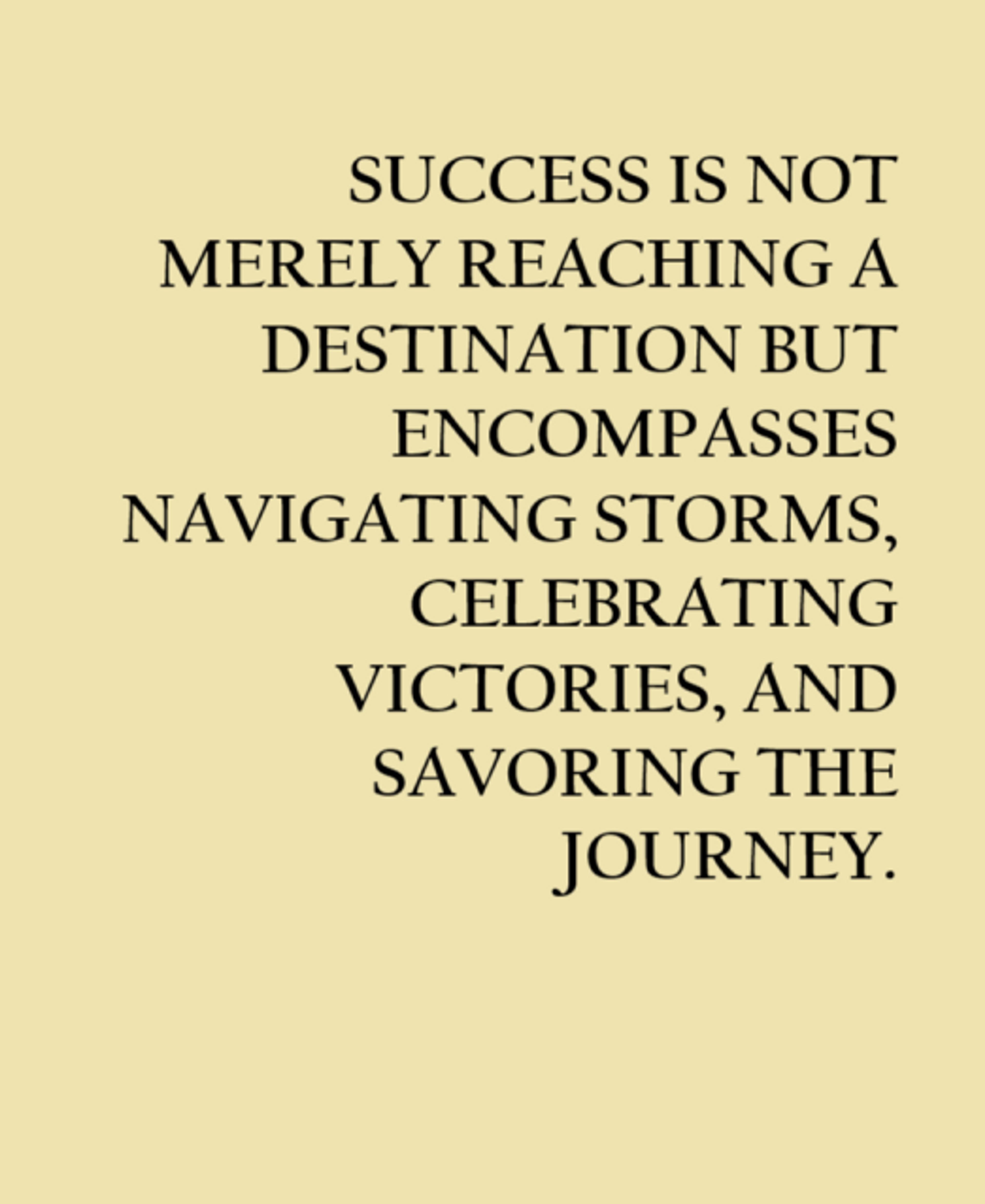10 Common Goal-Setting Mistakes to Avoid for Success


10 Common Goal-Setting Mistakes to Avoid for Success
Hello all the captains of dreams! Today, we embark on a journey to dissect the intricate art of goal-setting, exploring the common pitfalls that often lurk on the path to success. Join me as we unveil the 10 common goal-setting mistakes to avoid for a triumphant voyage to success.
In our pursuit of dreams and aspirations, it's crucial to recognize the potential obstacles that can turn the most promising journey into a challenging expedition. So, as we embark on this insightful exploration, let's cast a keen eye on the navigational errors that might lurk beneath the surface, ready to catch even the most seasoned sailors off guard.

1. Ambiguous Objectives: Dispelling the Fog of Uncertainty
In the vast expanse of goal-setting, clarity is the North Star that guides us through the intricate waters of uncertainty. To understand the profound impact of ambiguity, picture setting sail without a designated destination—a journey without purpose or direction. Vague objectives, much like navigating into a dense fog without a reliable compass, cast a veil of uncertainty over our aspirations, leaving us susceptible to drifting aimlessly.
Consider the common goal of "Get fit." While the intent is commendable, the lack of specificity makes the path unclear. It's akin to starting a voyage without charting a course—there's motion but no defined direction. This lack of clarity can lead to frustration, demotivation, and ultimately, abandoning the journey altogether.
Now, let's contrast this with a well-defined objective: "Complete a 5K in five months." Here, clarity becomes the lighthouse cutting through the fog of uncertainty. The destination is clear, the route is mapped, and every step taken is purposeful. This precision transforms a vague desire into a tangible target, providing a roadmap for success.
The importance of this clarity cannot be overstated. It not only ensures that efforts are focused and effective but also instills a sense of purpose and motivation. The specificity of the goal allows for the creation of a structured plan—each training session, each dietary choice, and every aspect of the fitness journey becomes deliberate and aligned with the ultimate aim.
In essence, the metaphor of sailing into the fog without a compass speaks to the danger of embarking on a goal without a clear direction. Just as a ship needs a compass to navigate through uncertain waters, a well-articulated and precise goal serves as the guiding force, leading us through the complexities of the journey and dispelling the fog of ambiguity. Aspiring for clarity in our objectives is not merely a strategic choice; it is the foundational principle that transforms aspirations into well-defined objectives, setting the stage for a purposeful and successful voyage.
2. Unmeasured Progress: Navigating by the Stars
In the intricate art of goal-setting, the importance of measurable progress is akin to the reliance of ancient sailors on the stars for navigation. Just as sailors needed fixed points in the vastness of the ocean to chart their course, successful goal-setters require clear benchmarks to transform abstract aspirations into tangible achievements.
Imagine sailing without the guidance of stars—a vast, dark sea with no reference points. Similarly, setting goals without measurable benchmarks leaves us adrift in uncertainty, with no clear indication of progress or direction. The goal, like a ship at sea, may be in motion, but its course remains unknown.
Much like sailors using celestial bodies to plot their course, having measurable benchmarks allows us to navigate our journey with precision. It provides clear indicators of progress, enabling us to assess how far we've come and make informed adjustments to our approach as needed. This approach ensures that our trajectory remains aligned with the intended destination.
The significance of measurable progress extends beyond mere tracking. As sailors celebrate reaching a destination, we, too, celebrate completing a book, hitting a sales target, or achieving any other measurable goal.
Moreover, this approach facilitates data-driven decision-making. By setting clear metrics, we gain the ability to objectively evaluate our progress. If the goal is to increase monthly sales by 20%, we can analyze sales data, determine the effectiveness of strategies, and adjust course as needed—much like recalibrating a navigation chart based on celestial observations.
In essence, the metaphor of navigating by the stars illustrates the critical role of measurable benchmarks in the goal-setting journey. It emphasizes that successful goal-setting is not just about moving forward but doing so with purpose and direction. Like sailors charting their course, incorporating measurable progress ensures that our goals remain not just aspirations but attainable destinations on the map of success.
3. Unrealistic Ambitions: Sailing in the Waters of Feasibility
Embarking on a sea voyage without considering the weather is an apt analogy for setting unrealistic goals without assessing their feasibility. While ambition is the wind in the sails of achievement, it must be harnessed judiciously, much like navigating through challenging yet attainable waters.
Think about setting sail on a ship without taking into account the prevailing weather conditions—turbulent seas, unexpected storms, or treacherous currents. Similarly, establishing goals without evaluating their feasibility is akin to plunging into uncertain and potentially turbulent waters. While ambitious goals are commendable, they must be aligned with the vessel's capabilities and the navigational skills of the crew.
The essence of setting realistic goals lies in striking a balance between challenge and attainability. Goals should be like planning a sea voyage—a journey that offers excitement and challenge, yet remains within the realm of feasibility. Aiming for a challenging but achievable destination ensures that the journey is adventurous without becoming reckless.
Consider the metaphor of aiming to complete a 5K run in eight weeks. This goal is ambitious, requiring dedication and effort, yet it remains within the bounds of feasibility for someone with a reasonable level of fitness.
Setting unrealistic goals can lead to frustration, demotivation, and burnout. On the other hand, realistic ambitions set the stage for success by providing a clear path forward. They serve as a compass that guides the journey, ensuring that the ship, or in this case, the individual pursuing the goal, navigates through waters that, while challenging, are navigable.
In essence, the analogy of sailing in the waters of feasibility underscores the importance of aligning ambition with practicality in goal-setting. It advocates for setting goals that inspire and challenge without risking the stability of the journey. Just as a skilled sailor assesses the conditions before setting sail, successful goal-setters evaluate the feasibility of their ambitions, ensuring a voyage that is both thrilling and achievable.
4. Neglecting Relevance: Aligning with the True North
In the vast expanse of goal-setting, neglecting relevance is akin to sailing without a compass, navigating without a clear sense of direction. While the sea of ambitions is vast, successful navigators align their course with the True North of relevance, ensuring that each goal contributes meaningfully to the broader vision.
Imagine setting sail without a compass, the navigation tool that aligns your journey with the cardinal directions. Similarly, neglecting the relevance of goals leaves us adrift in a vast sea of possibilities without a clear sense of purpose or direction. Every goal, like a ship at sea, should be aligned with the True North of our values, contributing meaningfully to our overall vision.
Relevance in goal-setting is about ensuring that each endeavor contributes to the bigger picture. If our overarching vision is a thriving, happy family, then our short-term goals should be like selecting the right course—something that aligns with our values and contributes to the joy of the journey. It's about keeping the popcorn-popping joy alive!
Consider the metaphor of planning a family movie night. The relevant choice would be a movie that aligns with the preferences and values of the family, contributing to the overall joy of the experience. Similarly, setting relevant goals ensures that each milestone achieved, each endeavor undertaken, is a step in the right direction.
Neglecting relevance in goal-setting can lead to a disjointed and unfulfilling journey. It's like sailing without a compass, where each turn is arbitrary and disconnected from the ultimate destination. On the other hand, aligning with the True North of relevance brings coherence to the journey, ensuring that each goal is a purposeful step toward the overarching vision.
Relevance is not just about setting goals; it's about setting the right goals—ones that resonate with our values, aspirations, and the broader context of our lives. When goals are relevant, they become more than just checkboxes to tick off; they become meaningful milestones that contribute to the richness of our journey.
In essence, the analogy of aligning with the True North underscores the significance of relevance in goal-setting. It emphasizes that successful navigators in the sea of ambitions are those who ensure that every goal is not just a point on the map but a purposeful step toward the fulfillment of a larger vision. Just as a compass guides a ship, relevance guides the goal-setter, ensuring a journey that is not only purposeful but deeply meaningful.
5. Procrastination Pitfall: Anchored in Inaction
In the vast sea of goal-setting, procrastination is akin to keeping the ship perpetually anchored in the harbor. Goals without deadlines lack the driving force that propels one forward, rendering the journey stagnant and unfulfilled. Establishing a timeframe, much like setting sail from the harbor, adds the necessary impetus, transforming dreams into a well-executed plan.
Picture a ship anchored in the harbor, its potential to explore uncharted waters indefinitely delayed. Similarly, procrastination acts as an anchor on our goals, holding them back from reaching their full potential. Without a defined timeframe, goals become vague aspirations, lacking the urgency needed to turn them into actionable plans.
Consider the metaphor of launching an online business. The goal itself is ambitious and promising, but without a deadline, it remains a dream waiting to be realized. Adding a timeframe, such as "Launch my online business in six months," injects a sense of urgency into the endeavor. It's like raising the anchor and setting sail—there's a clear direction, a timeline, and a purposeful journey ahead.
Procrastination often stems from the comfort of the familiar harbor, where the challenges of the open sea are avoided. Similarly, delaying the setting of deadlines can create a false sense of comfort in the status quo, preventing progress and growth. It's the reluctance to raise the anchor and embrace the uncertainties of the journey.
Establishing a timeframe is not merely about setting a date on the calendar; it's about creating a sense of urgency and purpose. Much like a ship that must leave the harbor to explore new horizons, goals need a defined timeframe to propel them forward. It transforms aspirations into a concrete plan of action, with each step designed to reach the destination within the specified time.
In essence, the procrastination pitfall is a reminder that goals without deadlines are like ships anchored in the harbor—full of potential but lacking the momentum to explore the vast sea of possibilities. Just as a ship needs to set sail to fulfill its purpose, goals need defined timeframes to break free from the inertia of procrastination and navigate towards success.
6. Neglecting Reflection: A Compass for Continuous Navigation
In the expansive ocean of goal pursuit, neglecting reflection is akin to navigating without a compass—inviting uncertainty and the risk of veering off course. Regular reflection serves as a compass, providing the necessary tools for course corrections and ensuring alignment with the intended path. Without it, individuals risk becoming like sailors lost at sea, adrift without a clear sense of direction.
Imagine embarking on a journey without a compass, where each turn and decision is made without a reference point. Similarly, neglecting reflection in the pursuit of goals leaves individuals without a guiding compass. Regularly assessing progress, learning from experiences, and adapting strategies become essential components of successful navigation.
Reflection is not merely a looking-back exercise; it's a compass that constantly points toward the True North of one's goals. It's the process of gauging the distance traveled, evaluating the effectiveness of chosen routes, and making informed decisions for the journey ahead. Like sailors using a compass to ensure they stay on course, individuals use reflection to maintain alignment with their intended path.
Consider a sailor in the vastness of the sea, relying on a compass to navigate through changing conditions. Similarly, individuals, as goal navigators, must rely on reflective practices to navigate through the complexities of life. Regular reflection allows for adjustments to be made in response to challenges and changing circumstances, ensuring a continuous and purposeful journey.
Neglecting reflection can lead to a sense of aimlessness—a feeling of being lost at sea without a clear destination. Successful goal-setters recognize the importance of periodically checking their compass, ensuring that each decision aligns with their values and aspirations. It's a proactive approach to navigation, preventing veering off course and facilitating a continuous journey toward success.
In essence, the neglect of reflection is a warning against navigating the waters of life without a compass. It emphasizes that regular introspection is not a luxury but a necessity for those aiming to achieve their goals. Like sailors using a compass to stay on course, individuals, too, must embrace reflection as a compass for continuous navigation, ensuring that each step is purposeful and aligned with their intended path.
7. Isolation Island: The Loneliness of Solo Sailing
In the vast expanse of goal pursuit, isolating oneself is akin to solo sailing without the camaraderie of fellow sailors. Goals, much like ships at sea, thrive in a supportive community. Sharing objectives, seeking advice, and celebrating progress with others cultivate a sense of unity—a camaraderie akin to sailors weathering storms and reveling in shared victories.
Imagine sailing solo on a vast sea, with no friendly sails in sight. The journey becomes lonely, and the challenges more daunting without the support and camaraderie of fellow sailors. Similarly, isolating oneself in the pursuit of goals can lead to a sense of loneliness and the weight of challenges feeling insurmountable.
Goals are not solitary endeavors—they flourish in the fertile soil of a supportive community. Just as sailors rely on the strength of their fleet during storms, individuals pursuing goals benefit from the collective wisdom, encouragement, and shared experiences of a community. Seeking advice, sharing objectives, and celebrating progress with others create a network that weathers the storms and revels in shared victories.
Consider a fleet of ships navigating through unpredictable waters. The strength of the fleet lies not just in the capabilities of individual ships but in their collective resilience. Similarly, individuals in a supportive community find strength not only in their individual pursuits but in the shared encouragement and understanding of like-minded companions.
Isolation in goal pursuit can lead to a lack of perspective, limited insights, and the absence of the motivational winds that come from shared victories. Just as sailors find solace in the company of their fellow seafarers, individuals pursuing goals find solace, encouragement, and inspiration in a supportive community.
In essence, the metaphor of Isolation Island is a reminder that goals are not meant to be pursued in solitude. It emphasizes the importance of building and nurturing a community that shares the journey, providing strength during challenging times and celebrating the victories together. Like sailors weathering storms and reveling in shared triumphs, individuals find fulfillment and motivation in the camaraderie of a supportive community on the seas of goal pursuit.
8. Fear of Failure Fog: Navigating the Unknown with Courage
In the expansive seas of goal pursuit, the fear of failure is akin to sailing through thick fog—it obscures one's path, instilling uncertainty and apprehension. Embracing failure as an inherent part of the journey, much like adjusting sails to changing winds, is a crucial mindset for successful goal attainment.
Imagine sailing through dense fog where the path ahead is shrouded in uncertainty. Similarly, the fear of failure creates a fog that obscures one's vision, making the journey seem daunting and treacherous. Just as sailors need strategies to navigate through foggy waters, individuals navigating through the fear of failure must cultivate a mindset that acknowledges failure as a part of the journey.
Fear of failure can paralyze progress, much like a ship stalled in foggy waters. However, adopting the mindset that failure is not the end but a natural part of the journey is akin to adjusting sails to changing winds. It's about embracing the uncertainties, adjusting course when needed, and moving forward with the understanding that failure is not a destination but a stepping stone toward success.
Consider a ship encountering unexpected changes in weather. Navigators don't abandon the journey; instead, they adjust their sails to navigate through changing winds. Similarly, individuals facing the fear of failure must adjust their mindset, acknowledging that setbacks are opportunities for learning and growth.
Navigating through the fear of failure requires courage—a willingness to confront uncertainties and persevere despite setbacks. Just as sailors navigate through foggy waters with a combination of caution and courage, individuals on the path to their goals must navigate through the fear of failure with resilience and determination.
In essence, the fear of failure fog is a metaphorical representation of the challenges posed by the unknown. It emphasizes that, like sailors navigating through fog, individuals must cultivate the courage to confront uncertainties, adjust their course when needed, and continue sailing toward their goals. By embracing failure as an inherent part of the journey, individuals can navigate through the fog with clarity and determination, ensuring that setbacks become stepping stones toward success.
9. Inflexible Course: Sailing Against the Current
In the vast expanse of goal pursuit, maintaining an inflexible course is akin to a ship refusing to adjust against the current. Such inflexibility in goal-setting invites stagnation, much like a ship struggling against unyielding tides. Goals, like a ship navigating changing tides, should be adaptive. Being open to adjusting sails and course, and embracing the ebb and flow, ensures continued progress on the journey.
Envision a ship steadfastly refusing to alter its course despite the strong current. The result is resistance, stagnation, and an arduous struggle against forces that could be navigated with flexibility. Similarly, in goal pursuit, being inflexible can lead to resistance against changing circumstances, hindering progress and growth.
Goals, much like a ship navigating open waters, should be responsive to the changing tides of life. The ability to adjust sails and course allows for a more seamless journey. Embracing the ebb and flow of circumstances ensures that setbacks are seen as temporary challenges rather than insurmountable obstacles.
Consider a ship adjusting its course to harness the power of the wind. Similarly, individuals adapting their goals to changing circumstances harness the power of resilience and flexibility. It's the acknowledgment that goals are not rigid destinations but dynamic journeys that require adjustments along the way.
Inflexibility can lead to a sense of being stuck, much like a ship unable to navigate the currents. The willingness to adjust course is not a sign of weakness but a testament to adaptability. Just as sailors navigate changing tides with strategic adjustments, individuals on the path to their goals must navigate through life's changes with an openness to adapt.
In essence, the metaphor of an inflexible course is a reminder that goals should not be set in stone. It emphasizes the importance of adaptability and the willingness to adjust sails and course when faced with changing circumstances. By navigating the ebb and flow with flexibility, individuals ensure that their goals remain dynamic and achievable, regardless of the challenges presented by the currents of life.
10. Neglecting Self-Care: The Sailor's Rest
In the vast expanse of goal pursuit, neglecting self-care is akin to a sailor navigating without adequate rest. Just as sailors need rest to navigate with precision, individuals pursuing goals need self-care to avoid burnout. Balancing goals with self-care becomes the wind that propels the ship. In this metaphor, rest becomes the fuel for the journey, ensuring sustained energy and focus.
Imagine a sailor pushing through relentless seas without taking a moment to rest. The result is exhaustion, diminished focus, and a compromised ability to navigate with precision. Similarly, neglecting self-care in the pursuit of goals can lead to burnout, affecting mental and physical well-being.
Goals, much like a ship on a long voyage, require sustained energy and focus. Neglecting self-care is akin to sailing without the wind—it diminishes the strength needed for the journey. Balancing ambitious goals with adequate self-care ensures that the sails are filled with the wind of well-being, propelling the ship forward.
Consider a ship embarking on a lengthy journey with strategic stops for rest. Similarly, individuals pursuing goals need to strategically incorporate self-care into their plans. Rest becomes the essential fuel that rejuvenates energy, enhances focus, and provides the resilience needed to weather the challenges of the journey.
Neglecting self-care can lead to a downward spiral, much like a ship navigating tumultuous waters without adequate rest. The sailor's rest, in this metaphor, becomes a crucial element in maintaining the vitality needed for successful goal attainment. It's a reminder that the journey to achieve goals is not a sprint but a marathon, requiring intentional pauses for self-care to ensure a sustainable and fulfilling voyage.
In essence, the metaphor of neglecting self-care as the sailor's rest emphasizes the importance of maintaining well-being on the journey to achieve goals. It underscores that self-care is not a luxury but a strategic necessity, ensuring that individuals have the energy and focus needed to navigate through the challenges and triumphs of their goal pursuit.
In conclusion, as we navigate the intricate seas of goal-setting, let us remember that success is not merely reaching a destination but encompasses navigating storms, celebrating victories, and savoring the journey. May your sails catch the winds of fortune, and may your compass guide you to the treasures of accomplishment.


